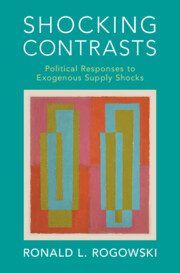Book contents
- Shocking Contrasts
- Political Economy of Institutions and Decisions
- Shocking Contrasts
- Copyright page
- Dedication
- Epigraph
- Contents
- Figures
- Maps
- Tables
- Preface and Acknowledgments
- Introduction
- 1 How Supply Shocks Arise and Why Political Responses to Them Vary
- 2 Who Adjusts to a Supply Shock and Who Resists It
- 3 Why a Technological Solution Does, or Does Not, Emerge
- 4 Exogenous Loss of Labor
- 5 Exogenous Gain of Labor: Railroads, Reproduction, and Revolution
- 6 Exogenous Loss of Land
- 7 Exogenous Increase of Human Capital
- 8 When the Endogenous Becomes Exogenous
- 9 Conclusion
- References
- Index
- Other books in the series (continued from page iii)
6 - Exogenous Loss of Land
Blockade, Hunger, and the Nazi Pursuit of Lebensraum
Published online by Cambridge University Press: 09 June 2023
- Shocking Contrasts
- Political Economy of Institutions and Decisions
- Shocking Contrasts
- Copyright page
- Dedication
- Epigraph
- Contents
- Figures
- Maps
- Tables
- Preface and Acknowledgments
- Introduction
- 1 How Supply Shocks Arise and Why Political Responses to Them Vary
- 2 Who Adjusts to a Supply Shock and Who Resists It
- 3 Why a Technological Solution Does, or Does Not, Emerge
- 4 Exogenous Loss of Labor
- 5 Exogenous Gain of Labor: Railroads, Reproduction, and Revolution
- 6 Exogenous Loss of Land
- 7 Exogenous Increase of Human Capital
- 8 When the Endogenous Becomes Exogenous
- 9 Conclusion
- References
- Index
- Other books in the series (continued from page iii)
Summary
The unforeseen extent and duration of World War I interrupted much of Europe’s access to the abundant lands of the New World, on which its food supply had come to depend. In Germany, the British blockade starved some 800,000 people; mortality increased most (over 60 percent) from malnutrition-related tuberculosis. Central to the appeal of Hitler’s National Socialist movement was its call for the conquest of Lebensraum in eastern Europe and western Russia – and the expulsion or extermination of those regions’ native inhabitants – as a means to self-sufficiency in food. Both in Mein Kampf and in his “second book,” Hitler argued explicitly that neither factor substitution, factor mobility, nor new technologies could guarantee Germans’ food supply; only the admittedly costly and risky route of conquest would suffice. When Stresemann’s “export powerhouse” strategy of factor mobility collapsed after 1929, Hitler’s alternative won strong popular support. In the “breakthrough” election of 1930, the Nazi vote increased most in the cities that had suffered the highest wartime mortality from tuberculosis. Hitler’s genocidal plan appealed especially to the populations that had endured the worst wartime hunger and death.
Keywords
- Type
- Chapter
- Information
- Shocking ContrastsPolitical Responses to Exogenous Supply Shocks, pp. 104 - 155Publisher: Cambridge University PressPrint publication year: 2023

